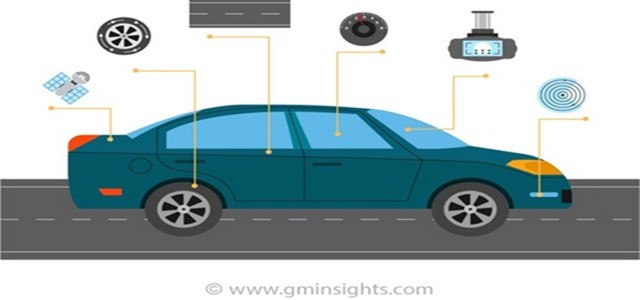Automotive End-point Authentication Market is set to grow substantially to 2025 owing to increase in the adoption of ADAS technology, increase in awareness regarding vehicle safety, and stringent automotive security regulations. The increase in chances of cyberattacks on connected vehicles that carry sensitive information is another factor that drives market growth. The autonomous vehicles require end-point authentication to avoid fatalities, which arise due to cyberattacks on the connected network. The increase in the number of connected & wearable devices over the network is also fueling the automotive end-point authentication market growth. The advancements in vehicle infotainment systems also enable enterprises to provide improved authentication systems to protect them from network threats.
The automotive end-point authentication requires continuous connectivity over the fleet, which is a big challenge for vehicles traveling in remote places, where connectivity is weak or unavailable. The extreme weather conditions, such as storm and heavy rain, can cause problems for an end-point authentication system to operate properly. The automotive end-point authentication systems are dependent on electrical wiring and batteries for their smooth functioning. The reliability of these electronic components is a major concern for the authentication system’s performance.
Request for an in-depth table of contents for this report @ https://www.gminsights.com/request-toc/upcoming/3405
Europe represents a key automotive end-point authentication market due to the increase in the demand for connected & autonomous vehicles. The German government authorities are taking major steps for the adoption of connected vehicles. For instance, in August 2017, the government adopted the action plan for automated driving systems. The Ethics Commission at the Federal Ministry of Transport and Digital Infrastructure provided the guidelines for the implementation of the automated driving systems. This government initiative helped in rapid & reliable adoption of automated driving across Germany. The adoption of smart cities in the region has enabled government authorities to improve the transportation system by connecting vehicles to the roadside infrastructure and with each other. These connected vehicles require automotive end-point authentication system to protect them from cyberattacks and unauthorized access.
Asia Pacific is a lucrative region for the automotive end-point authentication market due to smart city initiatives and an increase in the demand for passenger vehicles in developing countries such as China and India. According to the International Organization of Motor Vehicle Manufacturers, the passenger vehicle sales reached 24,961,948 in China and 3,227,701 in India in 2017. The growing internet penetration in the region is enabling higher adoption of wireless devices. These devices are increasing the chances of cyberthreats for connected & autonomous vehicles, leading to a growing need for reliable automotive end-point authentication solutions. The increase in awareness about vehicle safety due to the rising incidents of vehicle theft is another factor fueling the market growth in the region.
The major automotive manufacturing companies are partnering with cybersecurity companies to provide enhanced end-point authentication to the connected vehicles. For instance, in July 2018, Continental, a leading German automotive manufacturing company partnered with Argus, an Israel-based automotive cybersecurity solutions provider and Elektrobit (EB), a Finland-based leading supplier of embedded and connected software products for the automotive industry, for providing cybersecurity solutions for connected vehicles. This partnership helped the company in offering enhanced automotive end-point authentication solution for secure communication, authenticated identification, secure updates, and diagnostics for connected vehicles
Make an inquiry for buying this report @ https://www.gminsights.com/inquiry-before-buying/2986
The automotive end-point authentication requires continuous connectivity over the fleet, which is a big challenge for vehicles traveling in remote places, where connectivity is weak or unavailable. The extreme weather conditions, such as storm and heavy rain, can cause problems for an end-point authentication system to operate properly. The automotive end-point authentication systems are dependent on electrical wiring and batteries for their smooth functioning. The reliability of these electronic components is a major concern for the authentication system’s performance. The failure of the authentication system when a vehicle is in transit can cause security problems for automated & connected vehicles. Integrating the automotive end-point authentication system is costly and complex, increasing the capital expenditure of fleet companies. The lack of a skilled workforce to handle the authentication system can be a challenge to fleet companies.
Some of the major players operating in the automotive end-point authentication market are Pebble Technology, Fitbit Inc., Continental, Samsung Electronics, Hitachi, Fujitsu, Delphi Automotive, Robert Bosch, Toshiba, Johnson Electric, Mitsubishi Electric Corporation, NXP Semiconductors, Harman International, Infineon Technologies, Texas Instruments, Denso Corporation, Panasonic, HID Global, Garmin, and Nuance Communications.
Browse Full Reports: https://www.gminsights.com/industry-analysis/botnet-detection-market
About Global Market Insights
Global Market Insights, Inc., headquartered in Delaware, U.S., is a global market research and consulting service provider; offering syndicated and custom research reports along with growth consulting services. Our business intelligence and industry research reports offer clients with penetrative insights and actionable market data specially designed and presented to aid strategic decision making. These exhaustive reports are designed via a proprietary research methodology and are available for key industries such as chemicals, advanced materials, technology, renewable energy and biotechnology.

